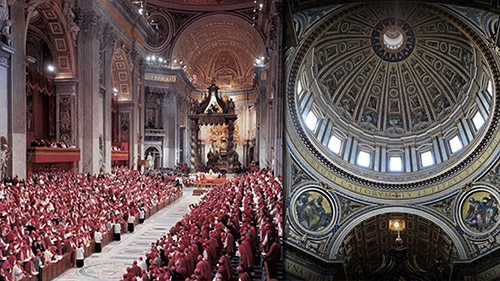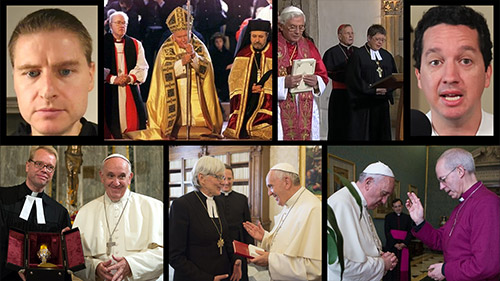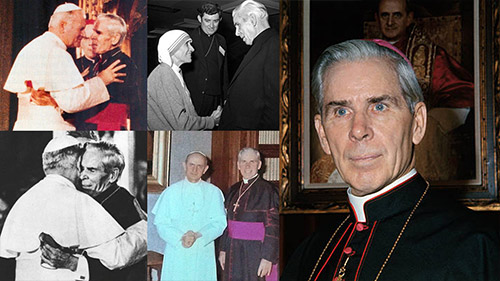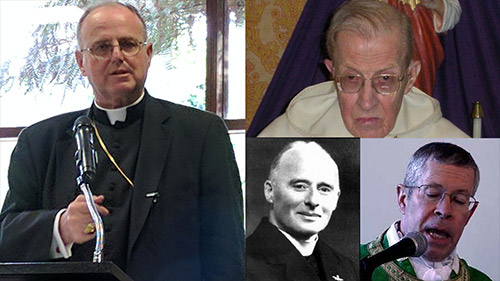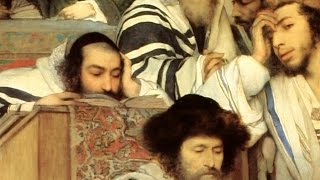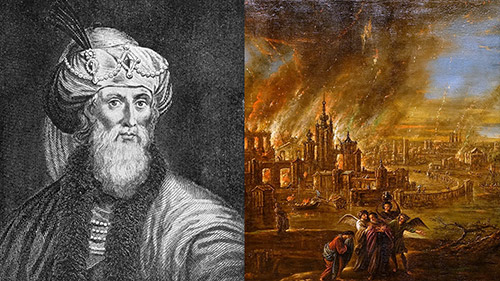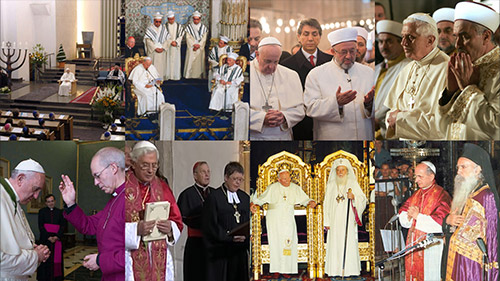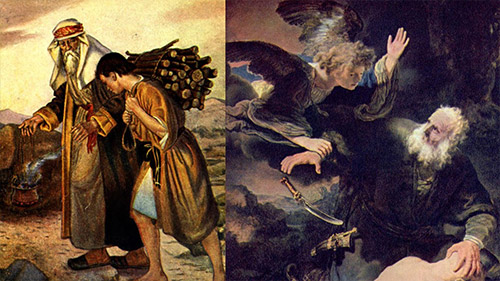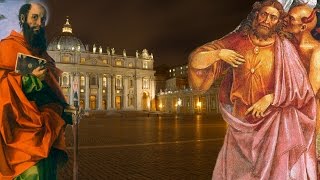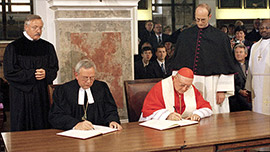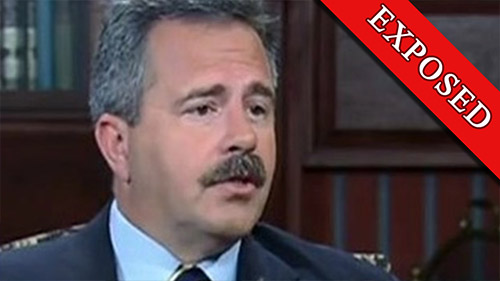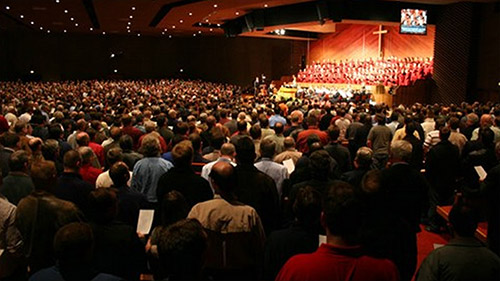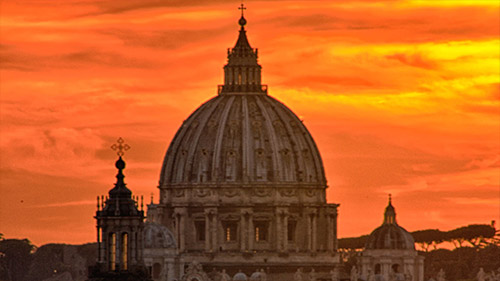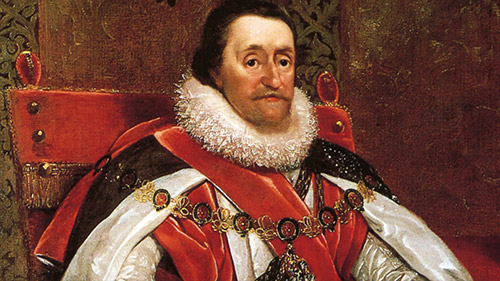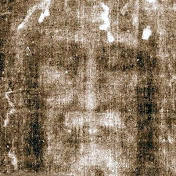 | vaticancatholic.com - English Channel |
Bible & Apologetics | Eastern ”Orthodoxy” - What Are Their True Beliefs? | Faith & Doctrine Bro. Peter Dimond The Eastern ‘Orthodox’ consider St. John of Damascus (who died in 749) to be a Church father and one of the most important theologians in Church history. The Catholic Church recognizes St. John of Damascus as a saint, a doctor of the Church, and the last of the Greek fathers. This video will show that St. John of Damascus taught the Catholic view of St. Peter’s authority, not the Eastern ‘Orthodox’ view. Before we prove this, we should point out that since Eastern ‘Orthodoxy’ is not a Church but rather a loose collection of sects, people who claim to be Eastern ‘Orthodox’ disagree with each other on many core issues, including Peter’s primacy, the primacy of the Bishop of Rome, councils, and much more. But the most common view among the various Eastern Orthodox sects and theologians is that although St. Peter had a leading role as spokesman of the Apostles, the Lord Jesus Christ did not give him a universal jurisdiction over the Church or authority over the other apostles. For example, Veselin Kesich (Eastern Orthodox theologian), who was dean of Vladimir’s Orthodox Theological Seminary, stated:
Fr. John Maxwell, member of the Orthodox Church in America, stated:
Eastern ‘Orthodox’ historian A. Edward Siecienski stated:
Now let’s quote St. John of Damascus. We will see that he taught the Catholic position on St. Peter’s authority, not the Eastern ‘Orthodox’ one. You will almost certainly never hear these points from any supporter of Eastern ‘Orthodoxy’. In his homily on the Transfiguration, St. John of Damascus teaches that Peter had a unique authority and that it involved jurisdiction over the entire Church. Referring to the Transfiguration, he states:
Here St. John refers to St. Peter as the president who was receiving the oars or the rudder or the steering of the entire Church. In the Greek he uses πάσης τής ἐκκλησίας, which means “of the whole Church” or “of the entire Church”. According to St. John, St. Peter steers the whole Church, which indicates that he possessed jurisdiction or authority to direct the entire Church. St. John thus teaches the Catholic view of St. Peter’s authority, not the Eastern ‘Orthodox’ one. St. John of Damascus also repeatedly refers to Peter as πρόεδρος (proedros), here using the accusative form πρόεδρον (proedron), which means ‘president’ or ‘the one seated in the first place’. This term signifies an authority of jurisdiction over the Church. We discussed the significance of that term in our video on St. Gregory Nazianzen, and we will come back to it. The next passage from St. John of Damascus states:
According to St. John of Damascus, St. Peter is the director or organizer of the Church throughout the whole world. Let me repeat that: of the Church throughout the whole world. In the Greek we find the words Ἐκκλησίας παγκοσμίου, which means: “of the Church of the whole world” or simply “of the universal Church”. That’s universal jurisdiction, folks. That’s the Catholic position on St. Peter’s authority, not the Eastern ‘Orthodox’ one. St. John also says that the Good Chief Shepherd has put the sheep into Peter’s hands, which again indicates that Peter has jurisdiction over all the sheep. In light of these facts and the clear biblical evidence itself, one can see what a ridiculous lie it is when Eastern Orthodox heretics make preposterous and demonstrably false statements, such the following nonsense from Jay Dyer:
In the next passage, which is about the Transfiguration, St. John of Damascus refers to St. Peter as the supreme head of the New Covenant and he compares him to Moses, the leader of the Old Covenant.
Well, we know that Moses had authority from God over the people of Israel. See Numbers chapter 12 and Numbers chapter 16 for what happened to those who rebelled against that authority. St. Peter has a similar authority from Christ over the New Covenant people of God, according to St. John of Damascus. The word translated here as “supreme head” is κορυφαιότατος. It’s important to consider the word. κορυφαιότατος is the superlative form of κορυφαῖος (koruphaîos or coryphaeus). κορυφαῖος means ‘chief’ or ‘supreme’ or ‘leader’. It comes from κορυφή (koruphḗ), which means ‘the highest point of the skull’ or ‘the top of the head’. Now when you have an adjective, for example, the word fast, the comparative form of that adjective would be faster. The superlative form of fast, which expresses the highest degree or grade, would be fastest. Likewise, with the adjective tall, the comparative form would be taller, and the superlative form would be tallest. Now, the word that St. John uses about St. Peter’s position (κορυφαιότατος) is the superlative form of κορυφαῖος – which, as mentioned, means ‘chief’ or ‘supreme’ or ‘leader’. St. John is thus saying that St. Peter is the chiefest or the supremest or the topmost in the Church. That indicates that while there are various heads in the Church (namely, the other apostles or bishops), there is one supreme head (St. Peter). St. John’s description of St. Peter as κορυφαιότατος once again shows that he held the Catholic position and he directly contradicted the heretical Eastern Orthodox one, which claims that no one apostle was above the others in authority. Christ is said to be the invisible head of the Church, while His Vicar, St. Peter, was the visible head after the Resurrection. True successors of St. Peter as bishops of Rome (that is, true popes) assumed the same office. In the next passage St. John speaks of St. Peter receiving the keys in a unique way.
St. John singles out St. Peter and refers to him in a unique way as the keyholder to the Kingdom of Heaven. MATTHEW 18 ALSO PROVES THE PAPACY All the Apostles are promised the power to bind and loose in Mathew 18, but only St. Peter was promised the keys in Mt. 16. For why these two passages considered together further prove Catholic teaching on the Papacy, we want to quote a short section from one of our other videos. Matthew 16:19, considered in conjunction with Mt. 18:18, further demonstrates that St. Peter, the first pope, was given jurisdiction over all the Apostles and the entire Church. This also powerfully refutes the position of the Eastern ‘Orthodox’. Matthew 16 is well known.
There Christ promises to give St. Peter, the first pope, the keys of the Kingdom and says whatever you bind upon earth shall be bound in Heaven, etc. But the Orthodox will often say, look at Matthew 18:18, where Christ says the same thing to all the Apostles.
Actually, that’s in essence exactly what Jesus did, as we will see. Referring to the apostles collectively, Mt. 18:18 says:
But far from contradicting the Papacy, this verse actually just further illuminates the truth of the Catholic position and refutes the Eastern ‘Orthodox’ one. Here’s why. There’s no mention of ‘the keys’ in this verse. The keys are only promised to St. Peter, as we read in Matthew 16. In Mt. 16 we also learn that people bind and loose with the keys. Let me repeat that: people bind and loose with the keys. “I will give you the keys of the kingdom… whatever you bind on earth”, etc. Peter alone is given that with which one binds and looses. So, when all of the Apostles are given authority to bind and loose, as we read in Mt. 18:18, with what will they do that binding and loosing? With the keys, of course. But Peter alone is given them (Mt. 16). So what does that tell us? It tells us that the authority that all the Apostles have is subject to Peter’s distribution or restriction of the keys. Since he is given the keys with which the others act authoritatively, he can distribute the keys to certain people or he can take away the keys. Since they need the keys to act, and he’s the one who has them, their authority is subject to his. So, contrary to what the Orthodox think, a careful consideration of the two passages together further proves the Papacy, the teaching of Jesus Christ against which they rebel. In the next passage St. John of Damasus again refers to St. Peter as πρόεδρος (proedros) or president of the Church, using the accusative form πρόεδρον (proedron).
As our video on St. Gregory Nazianzen mentioned, πρόεδρος (proedros), which means ‘president’ or ‘the one who is seated in the first place’, was a term applied to the position bishops held within their own dioceses. As πρόεδροι (proedroi) or presidents, bishops had power to rule their own areas, despite what some modern-day Eastern ‘Orthodox’ absurdly contend. So, when St. John and others identify St. Peter as πρόεδρος of the entire Church, that means that he had jurisdiction over the whole Church, just like bishops had jurisdiction within their area. Our video on Eastern father St. Gregory Nazianzen showed that he taught that the See of Rome was πρόεδρος or president over all other bishops and churches. That of course signifies universal jurisdiction. That’s the Catholic position on the Papacy. In the next passage St. John of Damascus says:
St. John uses the word ἐγχειρίζει, which means ‘entrusts’. It’s a form of the verb ἐγχειρίζω. This verb is connected with the Greek word χείρ, which means ‘hand’. ἐγχειρίζω literally means: ‘I put into one’s hands’ or ‘I hand over’. It was used to signify giving someone authority or control over something. According to St. John of Damascus, Jesus puts the Church into St. Peter’s hands. He hands it over to him. Thus, St. Peter has jurisdiction over the entire Church. The facts in this video constitute more clear proof that the Papacy is true. Those who reject it reject the Christian faith and work against Jesus Christ. Catholicism is true Christianity, while Eastern ‘Orthodoxy’ is definitely not. To be a true Christian and be saved, one must be a traditional Catholic, as our material explains. Copyright © 2022 Most Holy Family Monastery |
Eastern “Orthodoxy” Debunked On St. Peter’s Authority By St. John Of Damascus
February 11, 2022
SHOW MORE
Latest News
American Surgeon In Gaza Details The Shocking Atrocities Committed By the IDF Against Children - video
911 services in America are being outsourced to Israel - video
Josh Hawley Reveals Whistleblower Testimony On Trump Assassination Attempt - video
"VDARE Shutting Down Due To New York Attorney General Letitia James"
Pro-lifer sentenced to 41 months in jail on FACE Act charges after Biden DOJ prosecution



